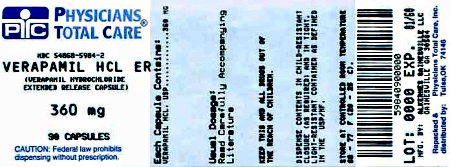
Verapamil Hydrochloride Capsule, Delayed Release Pellets while Breastfeeding
What is Verapamil Hydrochloride Capsule, Delayed Release Pellets used for?
Is Verapamil Hydrochloride Capsule, Delayed Release Pellets safe to use while breastfeeding? Can it interfere with growth and development of my kid?

Nursing Mothers Verapamil is excreted in human milk. Because of the potential for adverse reactions in nursing infants from verapamil, nursing should be discontinued while verapamil is administered.
Verapamil Hydrochloride Capsule, Delayed Release Pellets Breastfeeding Analsys
Verapamil hydrochloride while Breastfeeding
SafeCAS Number: 152-11-4
It is excreted in breast milk in clinically non-significant amount and no problems have been observed in infants whose mothers were receiving this treatment.Plasma levels in these infants were undetectable or very low. Verapamil may induce to an increase of plasma Prolactin levels. American Academy of Pediatrics: usually compatible with breastfeeding medication.WHO List of Essential Medicines 2002: compatible with breastfeeding.
Verapamil Hydrochloride Capsule, Delayed Release Pellets Breastfeeding Analsys - 2
Verapamil hydrochloride while Breastfeeding
CAS Number: 52-53-9
Limited information indicates that maternal doses of verapamil up to 360 mg daily produce low levels in milk and newborns may have detectable verapamil serum levels, but levels are low. Verapamil would not be expected to cause any adverse effects in breastfed infants, especially if the infant is older than 2 months.
What if I already have used Verapamil Hydrochloride Capsule, Delayed Release Pellets?
It is always a good idea to keep your healthcare provider or doctor informed about your drug usage during pregnancy and breastfeeding but if you have not informed your doctor about Verapamil Hydrochloride Capsule, Delayed Release Pellets and have used it then do not panic as Verapamil Hydrochloride Capsule, Delayed Release Pellets is mostly safe in breastfeeding and should not cause any harm to your baby.
My health care provider has asked me to use Verapamil Hydrochloride Capsule, Delayed Release Pellets, what to do?
Definitely, Verapamil Hydrochloride Capsule, Delayed Release Pellets is safe in lactation for baby. No wonder your doctor has recommended it.
If I am using Verapamil Hydrochloride Capsule, Delayed Release Pellets, will my baby need extra monitoring?
No extra baby monitoring required while mother is using Verapamil Hydrochloride Capsule, Delayed Release Pellets
Who can I talk to if I have questions about usage of Verapamil Hydrochloride Capsule, Delayed Release Pellets in breastfeeding?
US
National Womens Health and Breastfeeding Helpline: 800-994-9662 (TDD 888-220-5446) 9 a.m. and 6 p.m. ET, Monday through Friday
UK
National Breastfeeding Helpline: 0300-100-0212 9.30am to 9.30pm, daily
Association of Breastfeeding Mothers: 0300-330-5453
La Leche League: 0345-120-2918
The Breastfeeding Network supporter line in Bengali and Sylheti: 0300-456-2421
National Childbirth Trust (NCT): 0300-330-0700
Australia
National Breastfeeding Helpline: 1800-686-268 24 hours a day, 7 days a week
Canada
Telehealth Ontario for breastfeeding: 1-866-797-0000 24 hours a day, 7 days a week
